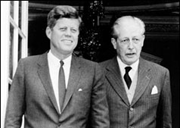 |
| The US President and
British Prime Minister cement a "special
relationship" |
|
1962: America to sell Polaris to
Britain |
Artificially 1969:
The President
Kennedy and British Prime Minister Harold Macmillan have announced the
formation of a multilateral Nato nuclear force after talks in Nassau, in
the Bahamas.
The agreement means the United States will sell Polaris missiles to the
UK.
The President has made a similar offer to France in the hope of
establishing a tripartite nuclear deterrent against the countries of the
Eastern Bloc.
Polaris, a two-stage solid-fuelled rocket system, is designed to be
fired underwater from a submarine. It carries a half-megaton nuclear
warhead at a speed of 17,500 mph (28,160 kph).
The British Government would construct the submarines and develop
warheads for Polaris with technical support from the US.
The deal has been described in the US press as a landmark in military
and political development in the Western world.
It is also regarded as the most constructive meeting held between
President Kennedy and Mr Macmillan.
However, there are now fears Britain will be too reliant on the US for
its nuclear deterrent in spite of the fact that the nuclear element of the
weapons system will be supplied by Britain.
At the end of the three-day summit, the two leaders issued a joint
statement.
In it, Mr Macmillan made it clear that Polaris missiles would be used
for international defence of Nato countries, except where Britain's
"supreme national interests are at stake".
This phrase is designed to show the British nuclear force is
politically independent of the US.
President Kennedy also sent a letter to France's President Charles de
Gaulle offering to sell Polaris as well as provide technical support.
It is hoped this will not only heal the current rift between France and
Britain over Mr Macmillan's "special relationship" with the US and
Britain's wish to enter the EEC, but also strengthen Nato as a whole and
allow France a greater role within it.
If France rejects the agreement, it will still be valid between Britain
and America.
The talks come just two months after the Cuban missile crisis when it
was revealed the Soviet Union's leader, Nikita Khrushchev, had set up
nuclear missile bases on America's doorstep.
In this context, President Kennedy and Mr Macmillan emphasised the need
for a unified defence programme.
"In strategic terms, this defence is indivisible and it is their
conviction," said the statement, "that in all ordinary circumstances of
crisis or danger it is this very unity which is the best protection of the
west."
The controversial American Skybolt missile project will be abandoned
due its high cost and questions about how long it would have taken to
complete.
The US currently has five Polaris A-1 submarines in service with a
range of 1,200 miles (1,931 km).
The A-2 version is being tested from improved Polaris submarines and
can reach 1,500 miles (2,414km).
A-3 missiles are due to be ready for use in 1964 and have a range of
2,500 miles (4,023km).
Compared with Skybolt missiles which carry warheads of nearly two
megatons, Polaris rockets are less powerful.
But they are also less vulnerable because Skybolts are dropped from
aircraft while Polaris submarines are much harder to
locate.